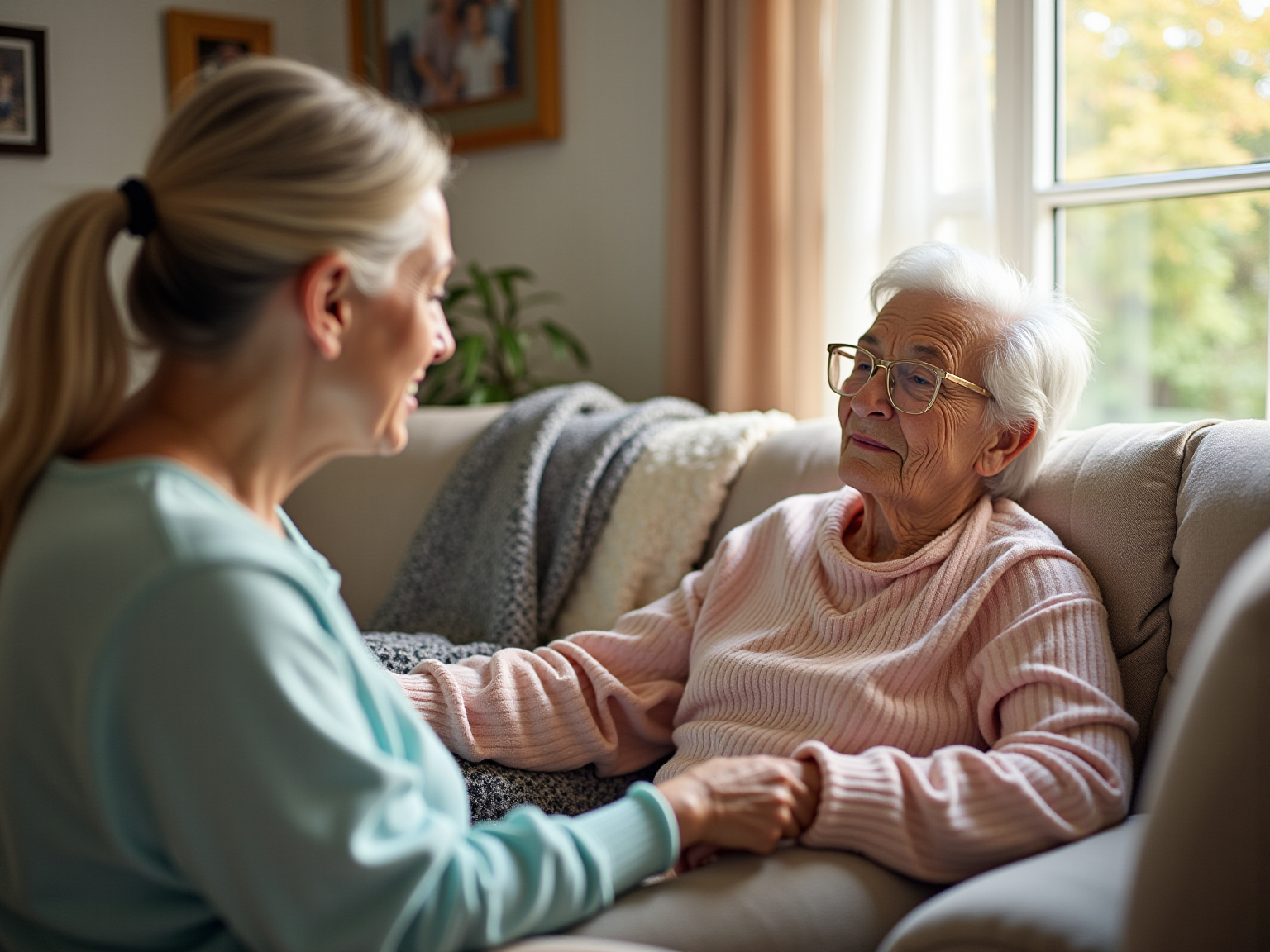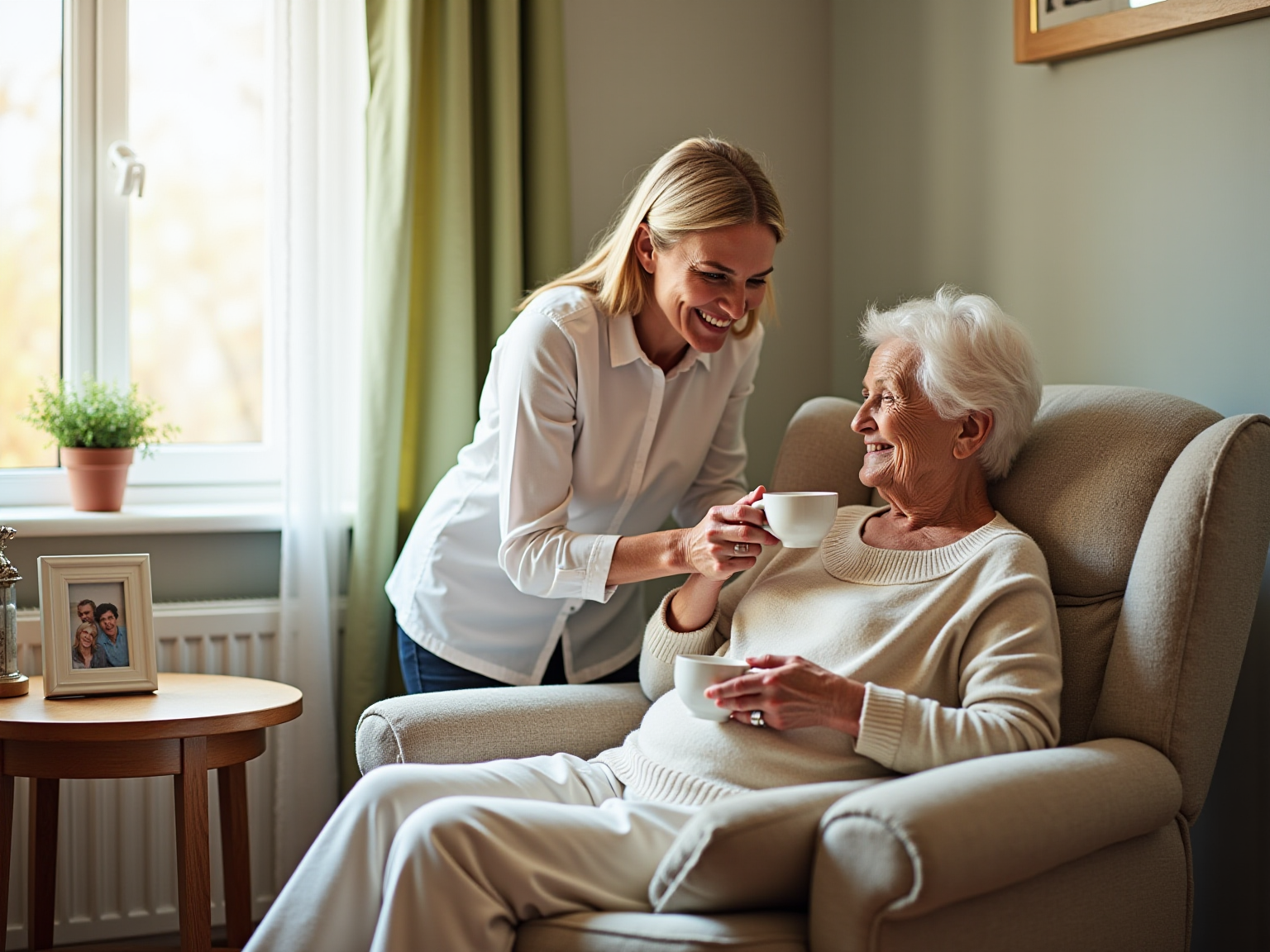Overview
Best practices for companionship and care center around providing emotional support and engaging activities that truly enhance the quality of life for our seniors. It’s important to recognize that effective companionship can alleviate feelings of loneliness and isolation. This nurturing approach significantly improves mental health and overall well-being. Research shows a clear link between social interactions and lower depression rates among older adults, highlighting how vital our connections can be.
In addition, we understand how essential it is to address the emotional needs of our loved ones. By fostering meaningful relationships, we can create an environment where seniors feel valued and connected. They deserve to enjoy their golden years with joy and companionship, and we are here to support that journey.
Furthermore, if you or someone you know is seeking companionship, remember that we’re here for you. Your comfort and happiness are our priority, and together, we can make a difference in the lives of seniors. Let’s take this step towards a brighter, more fulfilling experience for our loved ones.
Introduction
In a world where social isolation looms large over the elderly population, companion care emerges as a beacon of hope, offering much-needed emotional support and companionship. This vital service not only enhances the quality of life for seniors but also addresses the alarming issues of loneliness that can lead to serious health concerns. As families seek ways to ensure their loved ones remain connected and engaged, understanding the multifaceted benefits of companion care becomes essential.
Companion caregivers play a crucial role in enriching the lives of seniors by fostering meaningful interactions and promoting active participation in community life. Imagine the joy of having someone to share stories with, to engage in activities, or simply to enjoy a cup of tea together. This article delves into the significance of companion care, exploring its unique advantages compared to traditional caregiving, and highlighting how personalized support can transform the lives of older adults. We’re here for you, and your comfort is our priority.
Understanding Companion Care: A Vital Component of Senior Support
Companion assistance serves as a vital non-medical service aimed at providing companionship and care to seniors, significantly enhancing their quality of life. This kind of companionship and care addresses the urgent problems of isolation and loneliness, which are alarmingly prevalent among the elderly population. Involving companion caregivers from Best Care Nurses Registry plays a crucial role by initiating meaningful conversations, assisting with daily activities, and encouraging participation in hobbies and community events.
Research suggests that isolation can have significant health effects, with studies demonstrating that older adults who experience loneliness are at a greater risk for various health problems. For instance, the Senior Center Without Walls program, which offered numerous classes and services, highlighted the importance of community engagement in combating loneliness, serving over 5,400 callers in just one year. Best Care Nurses Registry reflects this dedication by offering individualized companionship and care that encourages relationships and addresses loneliness among older adults.
Companion care is especially advantageous for older adults who retain a level of independence but need assistance in interpersonal interactions. By cultivating a supportive atmosphere, companion caregivers offer companionship and care to older adults, assisting them in maintaining their dignity and independence while ensuring they feel appreciated and connected. Expert opinions underscore that companionship and care are not merely a luxury but a necessity for emotional well-being.
As Holt-Lunstad notes, “Social isolation is reflected in as a structural indicator of social connection while loneliness is a functional indicator,” emphasizing the critical need for companionship in maintaining mental health.
Effective initiatives that provide companionship and care, like those offered by Best Care Nurses Registry, have shown considerable effects on decreasing feelings of isolation among older adults. These programs not only provide emotional support but also promote active participation in community life, which is essential for mental health. By prioritizing companionship and care in senior support, Best Care Nurses Registry enhances the overall well-being of the elderly population, ensuring they lead fulfilling and connected lives.
If you are seeking compassionate and adaptable companion support options, reach out to Best Care Nurses Registry today at (888) 203-2529 to discuss your needs and discover more about our economical solutions. With decades of experience and a strong reputation in the home health sector, Best Care is a favored option for families looking for exceptional companion assistance.
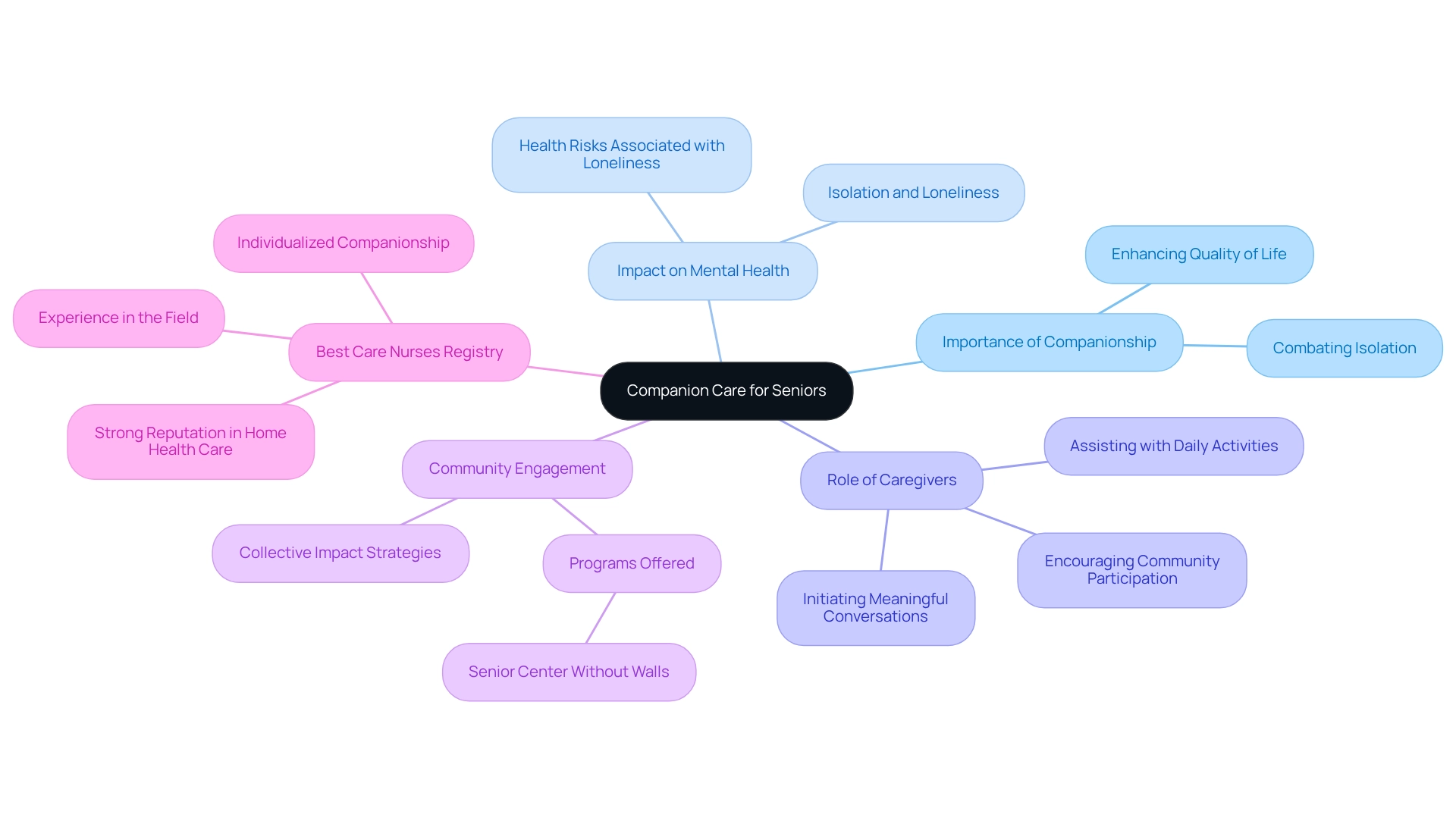
Companion Care vs. Traditional Care: Key Differences Explained
Companion support offers a distinct approach compared to traditional assistance, which typically involves medical aid and personal support tasks. While conventional caregivers often manage medication schedules and assist with personal hygiene, companion caregivers emphasize non-medical support. Their services include engaging older adults in meaningful conversations, accompanying them on outings, and helping with light household chores.
The primary goal of companion assistance is to enhance emotional wellness and encourage social interaction. This is especially beneficial for older individuals who may not require extensive medical attention but thrive on companionship and care. Research indicates that those receiving companion support enjoy a better quality of life, as these services address essential community needs often overlooked in traditional support settings. For instance, studies show that older adults who engage in regular social interactions are less likely to experience feelings of loneliness and depression, which can significantly impact their overall well-being.
Moreover, the benefits of non-medical assistance extend beyond emotional health. Statistics reveal that seniors with access to companionship are more likely to maintain their independence and engage in daily activities, leading to improved physical health outcomes. In fact, individuals facing food insecurity, who often lack community support, are more than twice as likely to report poor physical or mental health compared to those with adequate communal resources.
This highlights the importance of social support within companionship services, as it directly addresses these unmet needs.
Best Care Nurses Registry plays a vital role in this area by referring skilled caregivers, including CNAs and HHAs, who are thoroughly vetted and committed to excellence. These caregivers not only provide essential assistance with daily living activities but also offer emotional support, ensuring that seniors enjoy fulfilling and meaningful days at home. Additionally, Best Care Nurses Registry can obtain personalized treatment plans from physicians to tailor the assistance to each individual’s needs.
A case study titled ‘Elevating Alzheimer’s Support: The Role of Home Providers’ underscores the importance of companion assistance in enhancing the quality of life for Alzheimer’s patients. It illustrates how home support can significantly improve patient outcomes and provide crucial support for families navigating the challenges of caregiving. This aligns with the notion that functional outcomes should be included in the evaluation of programs and policies that discourage home health utilization, as noted by Rachel A. Prusynski, DPT, PhD.
In summary, companionship and care not only bridge the gap left by traditional caregiving but also play a crucial role in enhancing the overall well-being of older adults. By focusing on emotional and relational needs, companion caregivers from Best Care Nurses Registry help foster a supportive environment that promotes independence and enhances the quality of life for seniors. Recognizing caregivers’ contributions and addressing their needs is essential for creating a nurturing environment for caregiving, especially considering current legislation that often inadequately supports the numerous informal caregivers in the United States.
Call (888) 203-2529 to schedule a call and discuss your needs.
The Emotional and Social Benefits of Companion Care for Seniors
Companion care offers numerous emotional and communal advantages for older adults, significantly enhancing their quality of life. Regular interaction with a companion provides essential companionship and care, greatly alleviating feelings of loneliness and isolation, which are common among older adults. Research indicates that older adults engaged in social activities report lower levels of depression and anxiety, underscoring the importance of companionship and care for mental well-being.
In fact, the revised seven-item CES-D scale uses a score cutoff of 2 or higher, suggesting that companionship can lead to measurable improvements in emotional health. Companion caregivers offer both companionship and care, delivering crucial emotional support that helps elderly individuals navigate life’s challenges with greater ease.
The emotional benefits of companionship and care extend beyond mere interaction; they cultivate a profound sense of belonging and connection. This supportive relationship encourages older adults to maintain an active lifestyle, which is vital for their overall well-being. For instance, initiatives like the Center Without Walls in Manitoba demonstrate how technology can connect individuals, providing educational and recreational opportunities that address isolation.
During its 2014-2015 session, the program served over 5,400 callers, showcasing the demand for accessible companionship and engagement.
Furthermore, expert insights highlight that interpersonal interaction is a key factor in promoting mental health among the elderly. As the global population ages, with projections indicating that by 2030, one in six individuals will be aged 60 or over, addressing loneliness becomes increasingly critical. The National Elders Council states, “The isolation of older adults can lead communities to experience a deficiency in unity, increased communal expenses, and the loss of the wealth of experience that older individuals contribute to our families, neighborhoods, and communities.”
Approximately 14% of older adults live with a mental disorder, emphasizing the urgent need for effective interventions. Companionship and care not only alleviate these challenges but also enhance the lives of older adults, making it an essential resource in home health support.
Without CNA/HHA caregiver assistance, older adults may face significant difficulties, including health deterioration from insufficient medical oversight, inadequate nutrition due to poor meal preparation, and increased social isolation. Best Care Nurses Registry provides individualized home health solutions, including medication management and assistance with personal hygiene, ensuring that elderly individuals receive the customized support they need to improve their independence and quality of life. For more information on how to connect with Best Care Nurses Registry for these vital services, please reach out to us today.
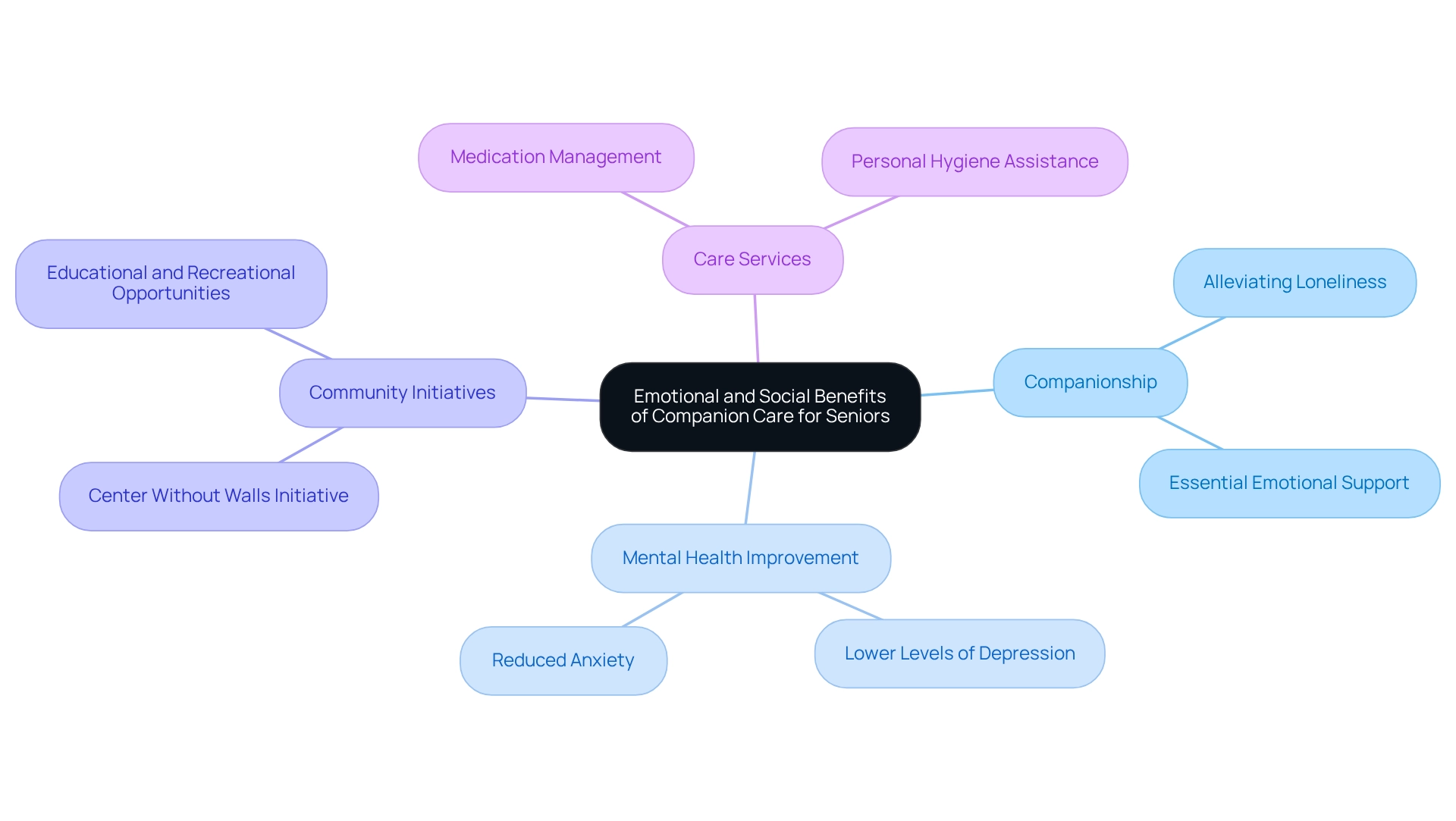
Services Offered in Companion Care: Customizing Support for Individual Needs
Companion assistance offerings are designed to be highly adaptable, catering to the unique needs of each elderly individual. These services typically encompass help with daily tasks, light cleaning, meal preparation, transportation to appointments or social gatherings, and essential companionship and care. By collaborating with families to create support plans, Best Care Nurses Registry ensures that the assistance aligns with the elder’s preferences and lifestyle, which is vital for nurturing a positive caregiver-client relationship.
Did you know that 89% of patients reported satisfaction with home healthcare options in 2022? This statistic underscores the effectiveness of tailored support. Customized support plans not only enhance the quality of life for elderly individuals but also reflect their personal preferences, which is essential for their emotional well-being. This is particularly important as social isolation and loneliness can lead to increased risks of depression and cognitive decline among older adults.
Experts emphasize that tailoring companionship and care options can significantly improve outcomes for elderly clients. Care managers stress the importance of understanding each elder’s unique situation, asserting that a personalized approach leads to greater engagement and satisfaction. For instance, a case study involving elderly individuals with varying levels of mobility revealed that those receiving customized companionship and care expressed higher levels of happiness and reduced feelings of isolation.
This illustrates the profound impact that personalized support can have on seniors’ lives.
According to U.S. News & World Report, over 1.4 million individuals live in Medicare- and Medicaid-certified nursing facilities across the nation, highlighting the substantial population in need of assistance. As the home assistance sector continues to grow, with an average annual increase of 2.3% from 2018 to 2023, the demand for companionship and care is more critical than ever. Policies encouraging caregivers to prioritize quality over quantity further reinforce this trend.
Moreover, it is essential to recognize the challenges faced by young caregivers, who often provide assistance while managing their own responsibilities. This highlights the need for robust support services. By prioritizing personalized support plans, Best Care Nurses Registry can ensure that elderly individuals receive the assistance they need to thrive in their daily activities.
The Importance of Caregiver Compatibility in Companion Services
Caregiver compatibility is essential for effective companion care at Best Care Nurses Registry. When elderly individuals are matched with caregivers who share similar interests, values, and personalities, it fosters a deeper connection that significantly enhances the caregiving experience. This alignment nurtures trust and comfort, allowing older adults to engage more openly and feel secure in their interactions.
Research indicates that the connections between caregivers and clients directly influence service outcomes. Suitable pairings lead to higher satisfaction levels among elderly individuals. Families should prioritize selecting caregivers who not only meet the practical needs of their loved ones but also resonate with them on a personal level. This thoughtful approach ensures that the companionship provided is meaningful and contributes positively to the overall well-being of elderly individuals.
For example, case studies reveal that successful caregiver-client matches can enhance emotional health and promote a greater sense of independence among elderly individuals. Furthermore, a study highlighted that a negative assessment of personal household finances was linked to a lack of support (OR = 1.37; p = 0.001), underscoring the broader implications of caregiver compatibility on financial well-being. Social workers emphasize that pairing caregivers with seniors based on compatibility is vital for creating a nurturing environment that enhances the quality of life for those receiving assistance.
Jill C. Slaboda notes, “These outcomes strengthen studies on caregiver stress and burden but on a national scale,” emphasizing the crucial role of caregiver compatibility in alleviating stress and enriching support experiences. Additionally, the demographics of caregivers suggest that the burden of assistance varies among racial and ethnic groups, which may impact compatibility and support outcomes. At Best Care Nurses Registry, we provide a range of personalized home health services, including help with daily activities like bathing, dressing, and meal preparation, as well as addressing medical needs such as medication management.
We are committed to ensuring expert caregiver matching that enhances both safety and emotional support for older adults and their families. If you have concerns about the well-being of your loved ones, we’re here for you. Call us at (888) 203-2529 to discuss your needs and schedule a consultation.
Combating Loneliness: How Companion Care Enhances Socialization
Companionship and care are essential in the fight against loneliness among older adults, a group increasingly vulnerable to isolation. Studies reveal that older individuals living alone face a greater all-cause mortality hazard ratio of 1.19 compared to those receiving daily visits from friends or family. This underscores the critical need for interaction. Companion caregivers significantly enhance the lives of older adults by actively engaging them in various communal activities, such as:
- Playing games
- Taking walks
- Enjoying meaningful conversations
These interactions not only provide emotional support but also stimulate cognitive function, fostering a sense of belonging and community. Without CNA/HHA caregiver services, elderly individuals may encounter numerous risks, including:
- Health declines due to lack of medical monitoring
- Poor nutrition from inadequate meal preparation
- Hygiene issues that can lead to infections
- Medication management challenges that may result in missed or incorrectly administered medications
Mobility difficulties can increase the risk of falls, while isolation can lead to depression and anxiety. The presence of a caregiver can mitigate these risks by ensuring that older adults receive personalized companionship and care tailored to their needs, helping them maintain their independence and dignity while enjoying a better quality of life.
For instance, initiatives like the University of the Third Age (U3A) illustrate how organized communal activities can transform the lives of older adults. U3A offers opportunities for older adults to acquire new skills and connect with others without the pressure of exams, promoting lifelong learning and community involvement. This initiative has shown that when older adults engage in community activities, their quality of life improves significantly, as they form new friendships and preserve cognitive vitality.
Moreover, mental health professionals emphasize the importance of companionship and care in combating loneliness and its associated risks. As noted by the National Seniors Council, “the isolation of seniors can lead communities to experience a deficiency in unity, increased community expenses, and the loss of the wealth of experience that seniors contribute to our families, neighborhoods, and communities.” Participating in communal activities not only elevates moods but also positively impacts cognitive function, aiding in the prevention of conditions like dementia.
By prioritizing social interactions through companionship and care, families can ensure their loved ones enjoy a richer, more fulfilling life, ultimately enhancing their overall well-being. Furthermore, caregiver assistance from Best Care Nurses Registry offers vital household management support, establishing a safe and organized living space, and providing reassurance for family members who want to ensure their loved ones receive quality attention.
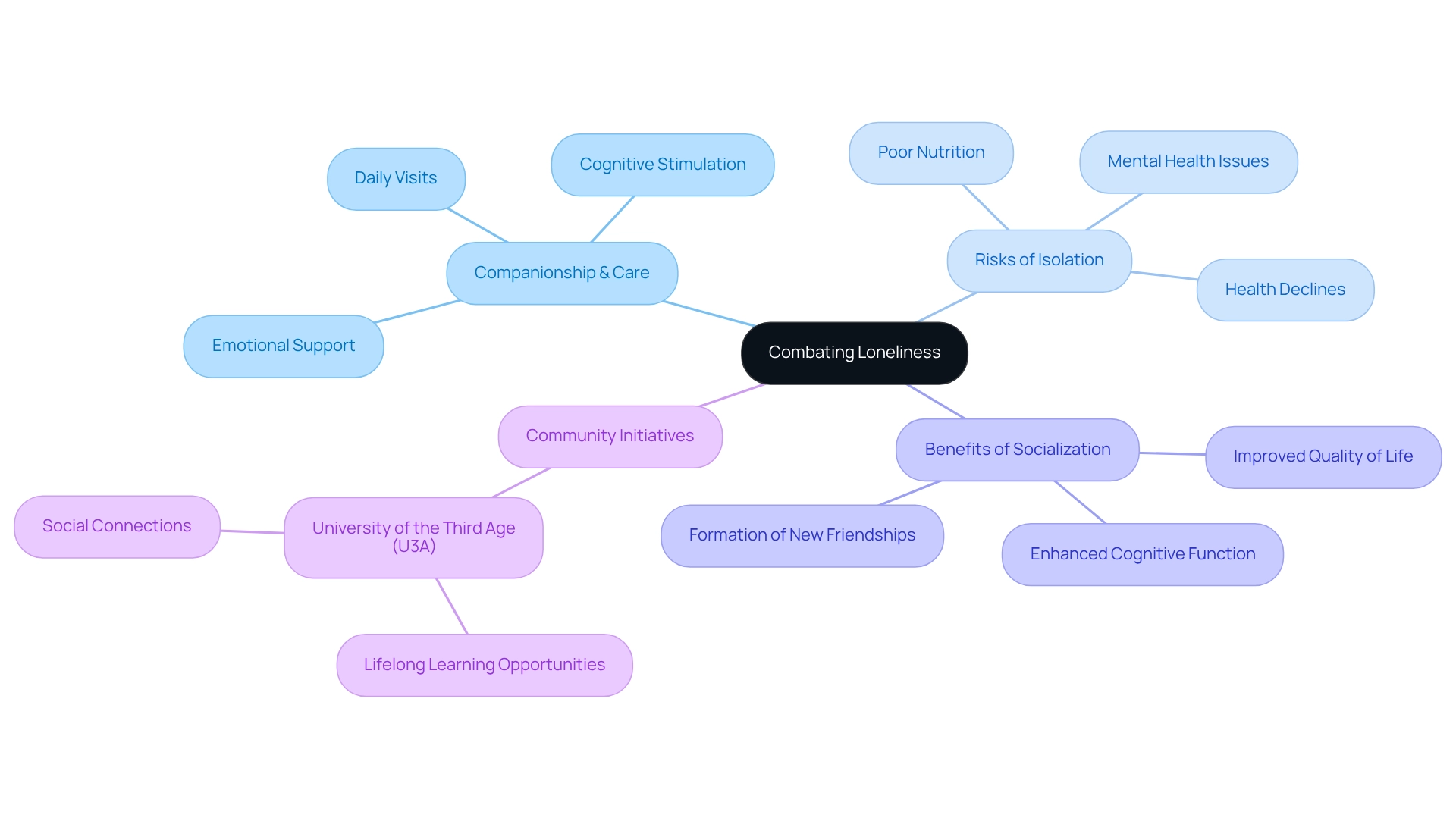
Best Practices for Families: Selecting and Managing Companion Care Services
Choosing options for companionship and care requires a thoughtful approach to ensure that elderly individuals receive the best support possible. Families should start by carefully assessing the unique needs of their senior loved ones, including their preferences for social interaction and daily activities. Understanding these needs is crucial, especially considering that around 14 million Americans over 80 are currently receiving home assistance. This highlights the importance of personalized options that prioritize safety, convenience, and emotional support.
Next, it’s essential to explore potential care providers. Focus on their reputation, experience, and the range of services they offer. Look for providers like Best Care Nurses Registry, recognized for their strong community track record and positive feedback from families who have benefited from their services.
During the interview process, prioritize compatibility with caregivers by asking them about their interests, hobbies, and their approach to companionship. This step is significant, as studies show that two-thirds of caregivers support policies that prevent workplace discrimination against those with caregiving responsibilities, underscoring the necessity for a supportive environment.
Maintaining open communication with the caregiver is another best practice. Regular check-ins with both the caregiver and the senior can help ensure that the senior’s needs are being met effectively. This proactive approach not only fosters a positive caregiving relationship but also enhances the overall experience for everyone involved.
For families, effective management of companionship and care can lead to improved health outcomes and a better quality of life for their loved ones. For instance, proactive oversight of at-risk groups can yield better health results, fewer emergency department visits, and improved medication adherence, as illustrated in the case study on Population Health Management in Home Assistance.
Incorporating insights from industry specialists can further guide families in selecting the right companion support options. Additionally, it’s important to acknowledge that 47% of caregivers have an annual household income of less than $50,000, highlighting the financial challenges they face. By focusing on compatibility and communication, families can cultivate a nurturing environment that promotes independence and well-being for older adults.
Given the increasing demand for elder support options, as shown by the 2020 census data indicating significant growth in the senior population, selecting appropriate resources for companionship and care is more critical than ever. Families should also consider the benefits of companionship and care services, which include encouraging physical activity and alleviating stress for family members. To begin this journey, reach out to Best Care Nurses Registry at (888) 203-2529 to discuss your needs and schedule a consultation. We’re here for you, and your comfort is our priority.
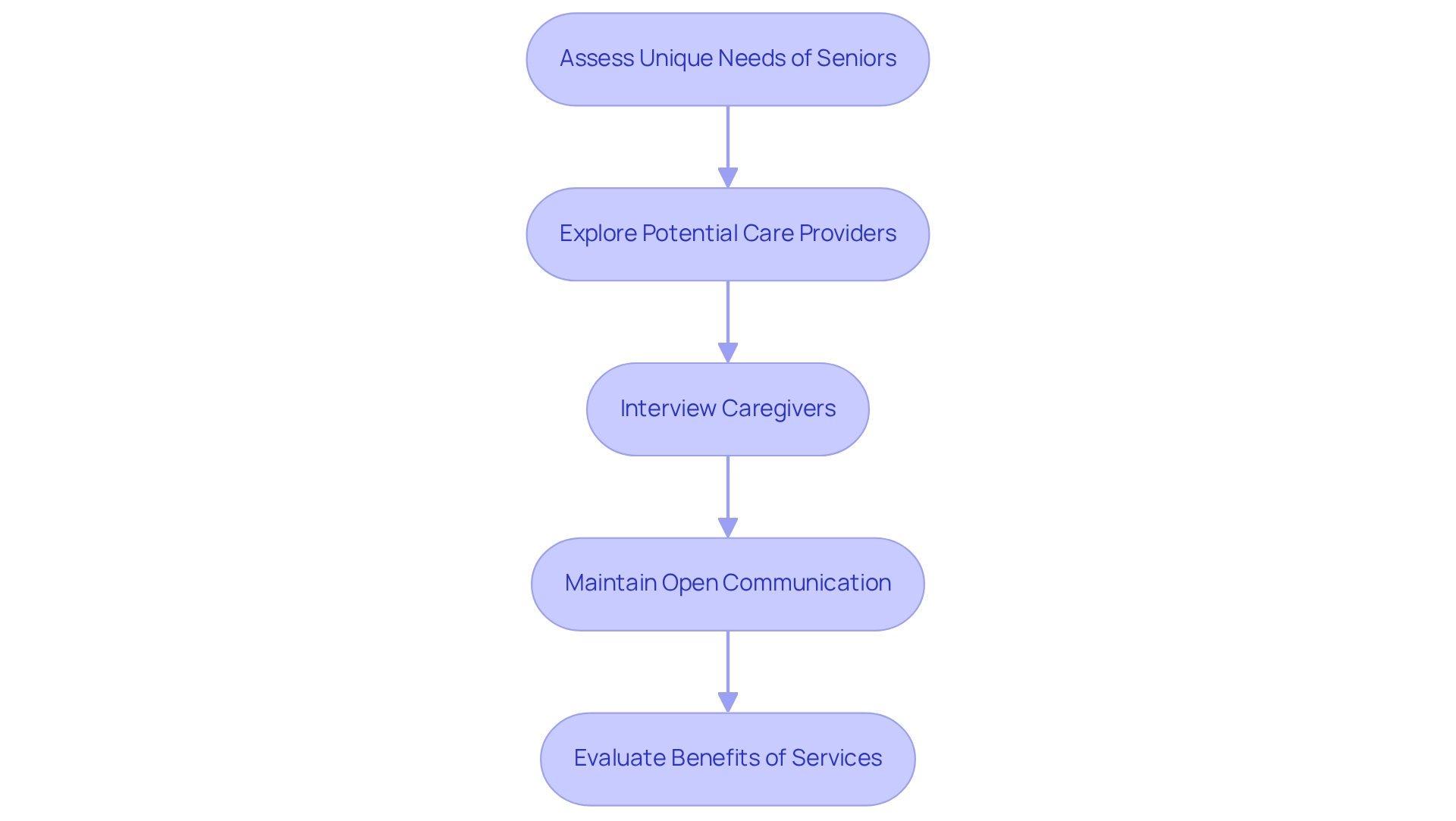
Navigating Financial Considerations: Insurance and Budgeting for Companion Care
Navigating the financial aspects of companionship is essential for families striving to provide the best support for their loved ones. It’s important to understand that while various insurance plans, including Medicare and Medicaid, may cover certain aspects of companionship assistance, confirming the specifics of each policy is crucial. As Jesse Slime, head of the American Association for Long-Term Support Insurance, wisely notes, “Your funds cover long-term support insurance, but it’s your health that truly purchases it.” This insight emphasizes the importance of comprehending insurance coverage for companion assistance, especially since insurers reject nearly half of applicants over the age of 70.
Families should prepare for potential out-of-pocket costs, which can vary based on the level of assistance required and the frequency of support. Recent data from the Cost of Care Survey reveals that:
- The national median expenses for homemaker assistance have risen by 10%.
- Home health aide costs have increased by 3% from 2022 to 2024.
This highlights the necessity of creating a detailed budget that outlines expected costs, enabling families to manage their finances effectively while ensuring their loved ones receive the necessary support.
In addition, with the occupancy rate for assisted living facilities increasing from 77% to 84% annually, the demand for support services is evident, making financial planning even more essential. Furthermore, exploring financial support programs and resources can provide additional relief in managing expenses. The Best Care Concierge Program, offered by Best Care Nurses Registry, connects clients with a network of professionals, including financial advisors, who can assist families in navigating these complexities.
Financial advisors recommend proactive planning for elder support as a way to ensure families can meet their loved ones’ needs without facing excessive financial pressure. By understanding the landscape of insurance coverage and planning appropriately, families can approach the intricacies of companion assistance with greater confidence. Best Care Nurses Registry’s decades of experience and strong reputation as a preferred choice for home health care services in South Florida further reinforce the importance of informed financial planning in this context.
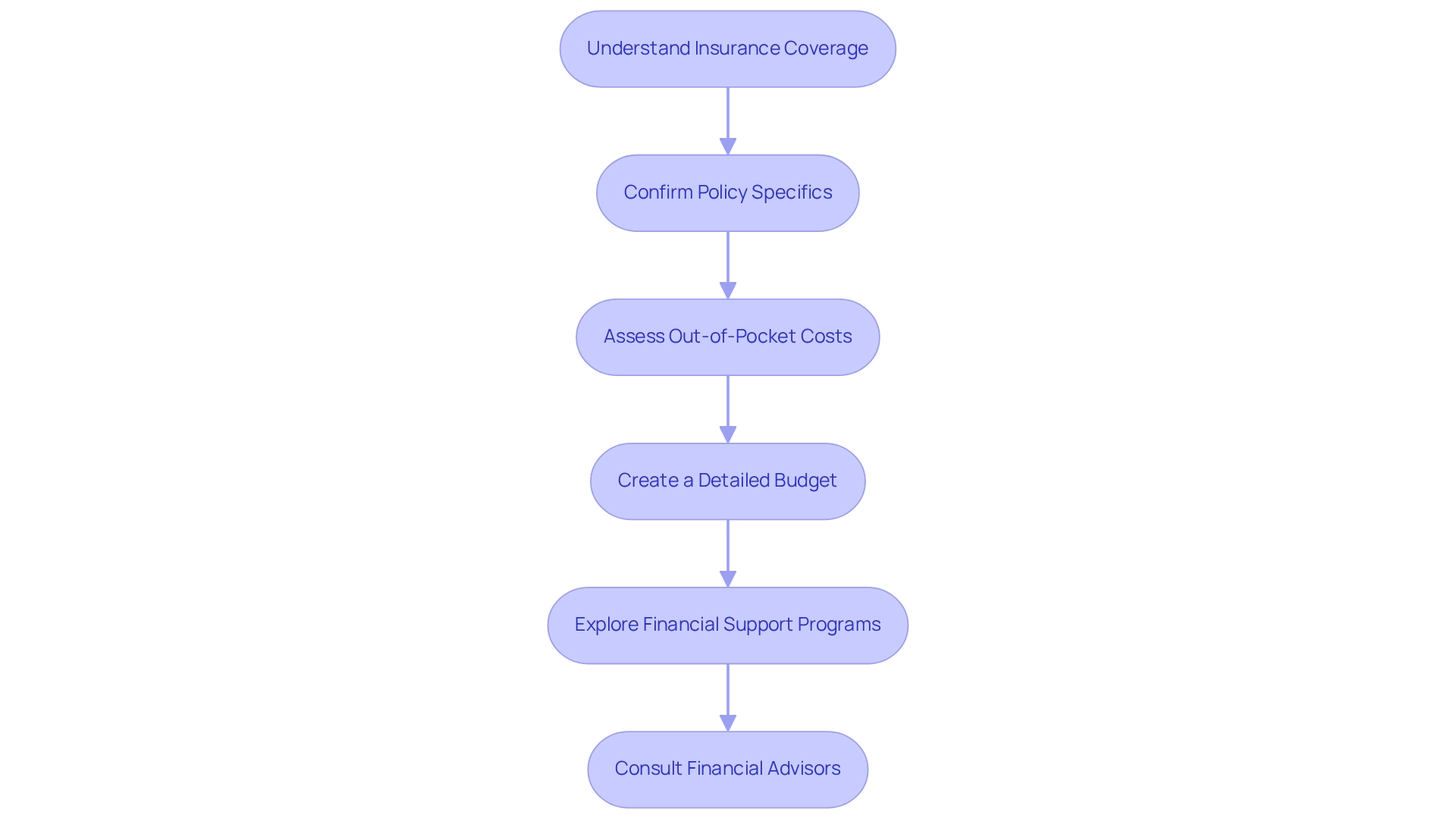
Conclusion
Companion care shines as a vital service that addresses the pressing issue of loneliness among seniors, significantly enhancing their emotional and social well-being. By providing personalized support and fostering meaningful interactions, companion caregivers play an essential role in improving the quality of life for older adults. This approach not only alleviates feelings of isolation but also promotes an active lifestyle, which is crucial for maintaining both mental and physical health.
The distinct advantages of companion care over traditional caregiving are clear, as it emphasizes emotional support rather than focusing solely on medical needs. This shift is particularly beneficial for seniors who cherish companionship and social interaction, leading to improved overall well-being. Research consistently shows that those who engage in regular social activities experience lower rates of depression and anxiety. This underscores the critical role of companionship in mental health.
Moreover, the significance of caregiver compatibility cannot be overstated. When caregivers and seniors share similar interests and values, it fosters deeper connections that enhance the caregiving experience. This compatibility builds trust and comfort, enabling seniors to engage more openly and enjoy their interactions, ultimately contributing to better care outcomes.
As families navigate the complexities of selecting companion care services, understanding the financial implications and tailoring support to individual needs becomes paramount. By prioritizing personalized care plans and maintaining open communication, families can ensure their loved ones receive the best possible support. This ultimately leads to a richer and more fulfilling life for seniors. Embracing companion care is not just about addressing immediate needs; it is a proactive step toward fostering a healthier, more connected, and vibrant community for older adults.
Frequently Asked Questions
What is companion assistance and why is it important for seniors?
Companion assistance is a non-medical service that provides companionship and care to seniors, significantly enhancing their quality of life by addressing issues of isolation and loneliness, which are common among the elderly.
How does companion care help combat loneliness among older adults?
Companion caregivers engage seniors in meaningful conversations, assist with daily activities, and encourage participation in hobbies and community events, which helps reduce feelings of isolation and promotes emotional well-being.
What are the health effects of isolation on older adults?
Research indicates that seniors who experience loneliness are at a greater risk for various health problems, including increased likelihood of depression and poor physical health outcomes.
How does Best Care Nurses Registry support seniors through companion care?
Best Care Nurses Registry provides individualized companionship and care, promoting relationships and addressing loneliness among older adults. They refer skilled caregivers who assist with daily living activities and offer emotional support.
What distinguishes companion care from traditional caregiving?
Unlike traditional caregivers who focus on medical aid and personal support tasks, companion caregivers emphasize non-medical support, engaging seniors in social interactions and light household chores to enhance emotional wellness.
What are the benefits of companion support for seniors?
Seniors receiving companion support enjoy a better quality of life, maintain their independence, and are less likely to experience loneliness and depression, which positively impacts their overall well-being.
How does social support within companionship services address unmet needs for seniors?
Companion services provide essential social support that helps seniors combat feelings of loneliness, especially for those who may lack community resources, thereby improving their physical and mental health.
What is the significance of personalized treatment plans in companion care?
Personalized treatment plans allow caregivers to tailor their assistance to meet the specific needs of each individual, ensuring that seniors receive the most appropriate care and support.
How does companion care benefit individuals with Alzheimer’s?
Companion assistance has been shown to enhance the quality of life for Alzheimer’s patients by providing crucial support and improving patient outcomes, which also aids families in their caregiving challenges.
How can someone seeking companion support contact Best Care Nurses Registry?
Individuals can reach out to Best Care Nurses Registry at (888) 203-2529 to discuss their needs and learn more about the available companion support options.



